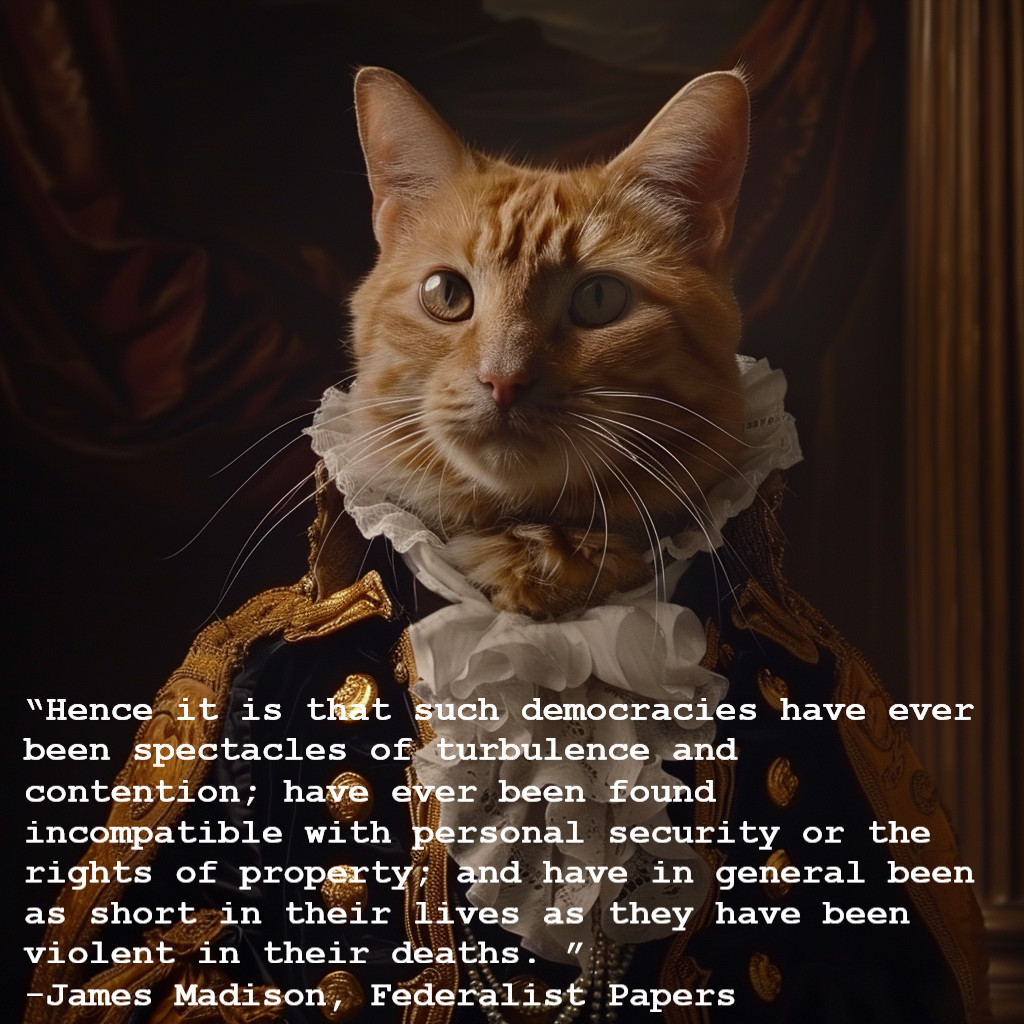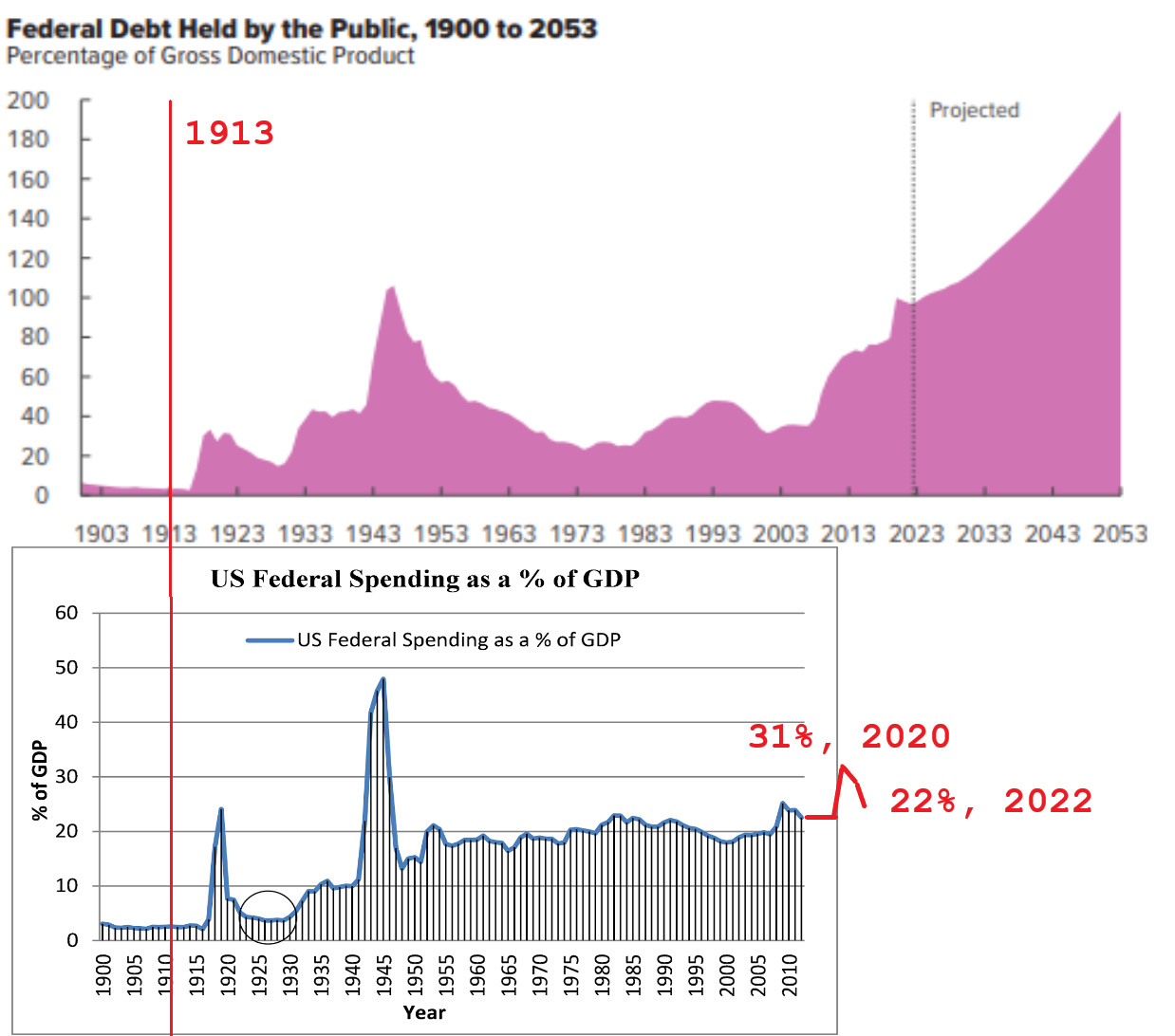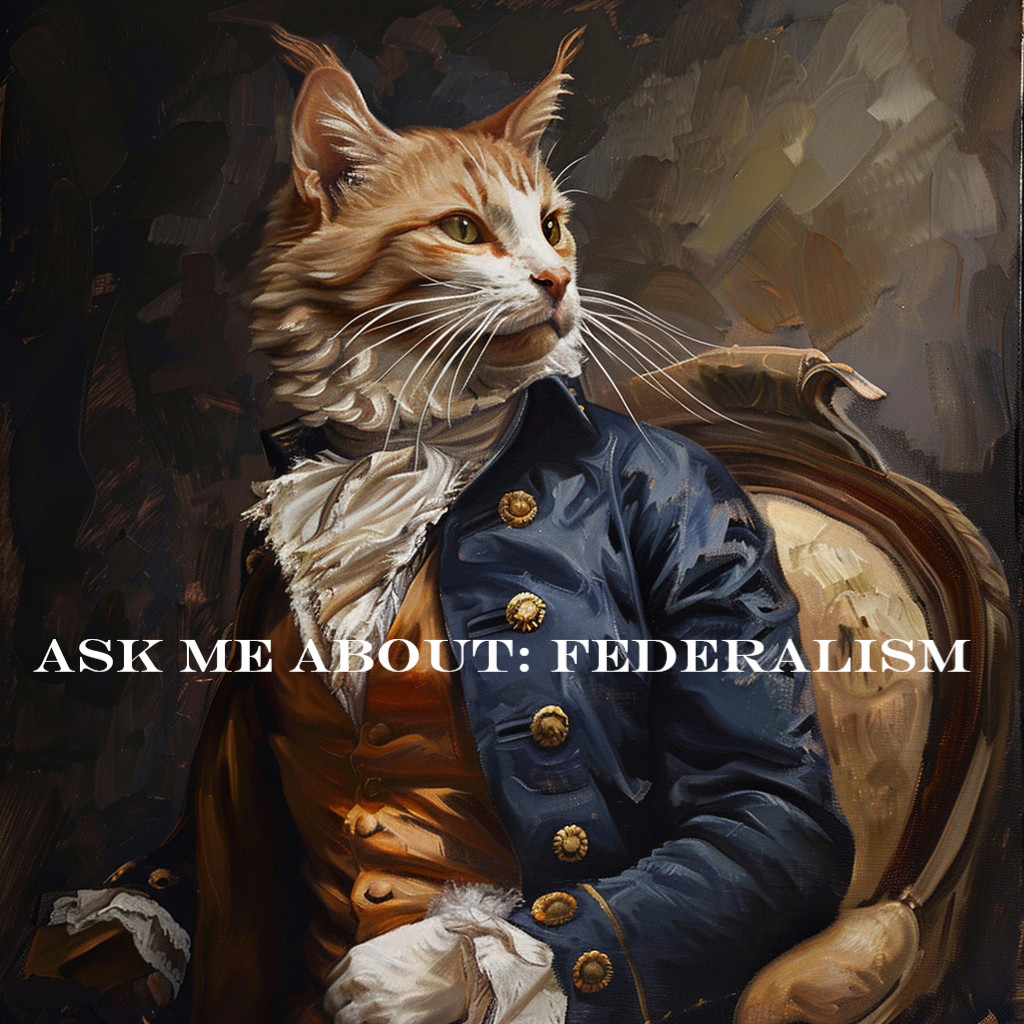By El Gato Malo
Bad Cattitude
February 21, 2024
The genius of the free market lies in harnessing the power of consumer sovereignty. free people make free choices and these choices provide the information, distilled into simple salients like "demand level" and "price," that informs every producer in the world what to make and how to make it. this emergent data determines the trade offs faced in production and consumption and perhaps more importantly, it makes these trade offs visible and measurable so that those seeking to serve the market can see and understand what the market's participants truly want and truly value.
This all stems from those who desire things signaling honestly about their preferences by engaging in trades and behavior. how do i know that you value a snickers bar at more than $1? because you just paid a dollar for it of your own free will. how do i know you valued a candy bar over other possible uses for that dollar? because that's what you chose to do. economists call this pareto optimality. free people transacting freely only trade something for another thing that they value more and their choices around doing so reveal an honest and irrefutable preference function.
This is a staggering amount of information and it's what, in a free market, makes the customer king and subjects those who would serve them to the most exacting of discipline. pretty soon, you basically cannot buy a bad dishwasher even if you tried because the rigors of competition and the demands of consumer sovereignty have rendered them extinct. you're basically guaranteed to get at least 2 of three from the list of "good, fast, cheap" and increasingly, you can often get them all.
But monopoly breaks this. consider cable companies. they were avatars of DMV level awfulness until they started facing competition from other forms of communication and streaming. consider utilities. basically every durable monopoly you run into is underpinned in some way by government. this is because, government itself is a monopoly and as less and less of it becomes even visible, much less accountable to we the people, this only grows worse because government breaks price signals, demand signals, consumer sovereignty, pareto optimality, and most other useful parts of a market.
Consider something as simple as a public park. people like parks. but parks cost money. they also take a scarce resource (conveniently located land) and prevent it from being used for other purposes. because governments collect money by force and then spend it without much in the way of feedback, they would have no idea what the public really wanted even if they were 100% dedicated to trying to serve that desire. (itself, obviously, an implausible assumption) do people really value a park? how much? do they value it more than a bridge or a boat ramp or selling the land to a food truck park and using the cash to improve the school?
Who would you trust to know this, much less to apply it honestly?
It's instantly obvious once you start to think about this in even rudimentary detail that there is absolutely no way to impose, from the top down, choices serving anything remotely resembling the societal preference function. there is no way to know what it is. society itself cannot know what is is and electing a leader to pretend to do so when 500 or 5 million issues may be conflated all at once and none can be individually broken out makes any approximation through democracy ridiculous, especially given both the bureaucratic nature of spending, regulation, and taxation and the fact that 1% of the demos pays about half of all taxes and the bottom 70% pay basically nothing at all on a "net of transfers and benefits" basis and where there seems to be no penalty for running up egregious debt and making current largess a problem for future generations. when most of society experiences government spending as "free," you're never going to get rational or even reasonable choices: you're going to get runaway rapaciousness.
So long as the system remains avolitional and coercive, there's really no way out of this. there is no "consumer sovereignty" and no "market discipline for government." unless you can say "no" then the things you'll be made to say "yes" to will bear little resemblance to what you want. you essentially cannot escape. even deciding to just leave and give up US citizenship requires affirmative permission that is increasingly difficult to secure and that triggers a massive taxable event on every one of your assets which will be marked to market and treated as sold. until you pay that tax on unrealized gains, you cannot leave US tax jurisdiction. not exactly "land of the free" is it? more like tax serfdom for the prime producers. the US knows better than to let their prize milchcows jump the fence.
But it doesn't have to be like this.
It was not, in fact, supposed to be like this.
this is not what the framers designed and the current structure of the US is an outright inversion of their intent. these "united states" were supposed to be federalist with the states as prime movers, united under a small and weak federal government limited, by design, to its specifically enumerated powers.
remember this? (because the federal government doesn't)
consider how different that nation might be. a small central government, mostly facing outward and focused on a few matters like the common defense, borders, etc and then the 50 states, each as a sort of lab experimenting with ideas around trade and regulation and services and taxes between which each and every american would be free to choose. simply vote with your feet and move.
states could become different in a manner that they cannot beneath such pervasive federal yoke as pervades in our current form of governance. they could cater to different folks, different businesses, different ideals. they would vary FAR more than they do today where so many regulations, taxes, and strictures are federal and where federal funding has come to dominate so much state activity.
they would need to compete for you.
states would need to provide value for money on taxation lest their people leave.
states inability to run deficits and a need to balance budgets without printing money would impose far greater discipline.
and "consumer choice" would thrive and competition would drive competence and those who were unable to compete would fail and need to change tack or wind up replaced.
we could probably blast this into the stratosphere by allowing regions to secede from states and found their own or merge with adjacent ones, but this is likely not even necessary to get 90%+ of the benefits of a market.
this federalist system of consensual competitive competence was the design intended for the "united states of" america.
it was broken by one thing and we could, if we wished, likely unbreak it by removing that one thing.
this thing happened in 1913, just as wilson and the first round of US fascists (in the classic sense of command and control economy, rights suppression, subjugation to the collective, and "paternalism knows best") and globalists changed the face of america and the power of the central government forever.
prior to 1913, US federal debt was minimal. the federal budget was generally less than 2% of GDP.
and then...
this "thing" was the 17th amendment.
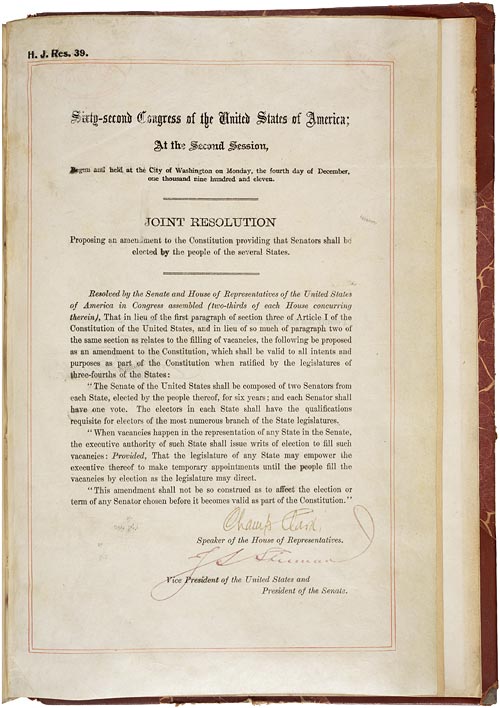
this is a funny one. it's barely taught in school and to the extent it is, it's taught as a sort of "liberation" and as "making america a true democracy." at best, you hear a few stories about "deadlocks" and "not being able to elect a senator because the two houses of a state could not agree."
so they changed the fundamental nature and function of the US government in a truly radical way that few seem to understand (or even remember).
"let's let the people directly elect their senators instead of having the state legislatures do it" sounds like empowerment. but it's not. it's subjugation.
democracy sucks. democracy is unaccountable tyranny of the majority. it's coercion. it's 2 wolves and a sheep voting about what's for dinner. it was not what our framers intended. it was, quite literally the diametric opposite of the framers' intention and their genius.
the intended role of the senate in the US federalist republic was not to stand for the people, it was to stand for the states.
the house was intended to stand for the people and was thus elected by the people.
the role of the senate was different.
the role of the senate was to protect the states, their governments, and their prerogatives from the federal government.
that's why the fascist/golbalist centralizers of power wanted it ripped out.
"preventing deadlocks" was a thin gruel of pretext for what amounted to the greatest power grab in american history. this is what set up wilson who, in turn, set up FDR who so egregiously altered the character of federal intrusiveness in america for all time. and seriously, so what if a couple senators fail to seat? good. who cares? where's the tragedy?
much of this came down to huge oversteps of the enumerated powers to which the federal government was supposed to be limited being rubber stamped by the supreme court who was supposed to be calling out constitutional foot faults on this and striking down federal agencies and overreach.
instead we got durable doctrinaire judicial deference and absurdist readings of preamble and commerce clause that enabled regulation, usurpation, and taxation so far outside any plausible enumerated purview that essentially all manner of spending and interference was allowed, enabled, and encouraged. hell in a bucket indeed...
there is a reason that approval of supreme court justices, other federal judges, cabinet members, and suchlike was a power vested in the senate. it was supposed to be used by representatives of the state legislatures in defense of the state legislatures and to protect them from predation by a grasping center as lecherous leviathan sought to sink tentacles into that which was meant to be reserved for the states, taking their rightful powers for itself like a central government sinkhole expanding to consume a nation.
such jurists and cabineteers as appointed by state legislatures in defense of state legislatures would tend to have an altogether different character, one rooted in the primacy of the several states and in which the federal government would be seen as a nuisance and a trespasser, not as a solution or a suzerain.
imagine the nation we might have had had this been so.
imagine what we might have avoided.
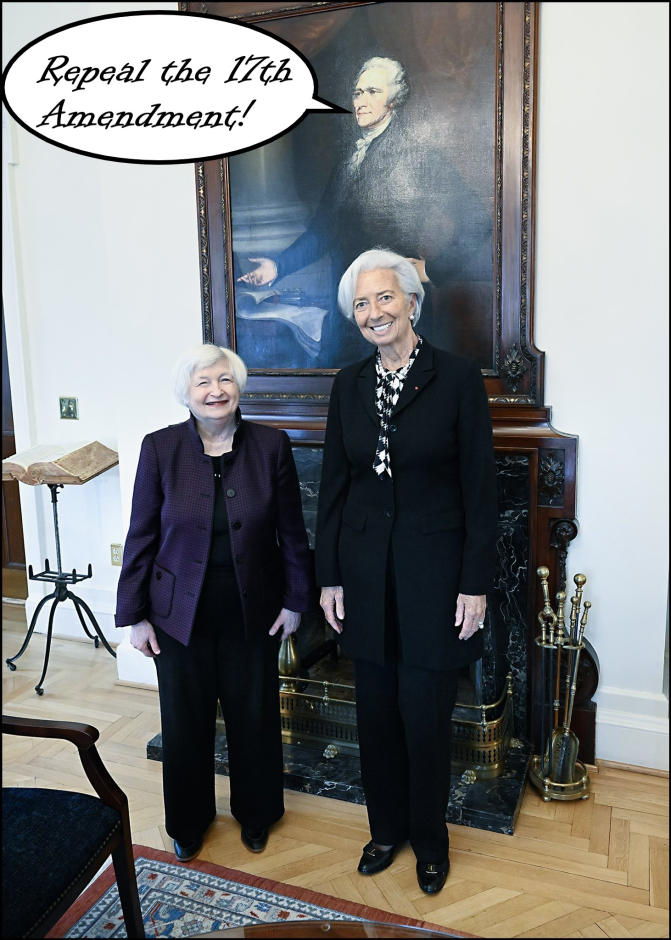
imagine a weak DC and strong states and localities each determining their own domains (and kept from breaching basic rights by a federal government and judiciary which would check them in turn) instead of the unchecked and unbalanced calamity of the post 17th amendment "democracy."
imagine not seeing every federal election for president as some existential threat to the way of life for half the nation or constantly being trapped between only two choices each awful and with no middle or orthogonal course and no escape.
imagine the power such a system would devolve to people empowered vote with their feet and the discipline it would place upon the states to serve these people and to prove value for money.
imagine the pressure upon states to move to "user pays" systems for many programs to accurately and granularly gauge the preferences of we the people and the trade offs between projects so that they might better serve the populace instead of the "one size fits none" of more general taxation and spending.
imagine citizen as customer instead of society as serfs.
this is what we could have had.
this is what we were supposed to have.
honestly, it's what we probably could have still if we could only muster the political will to repeal the 17th amendment, turf out the whole of the senate and the SCOTUS, and re-staff them and re-instate 2/3rds cloture.
it's supposed to be just about impossible to get things through the senate. that was a core protection for we the people and for the power of the states.
this is a feature, not a bug.
the state must serve the people, not the people the state and it will never do so unless the people have the right to say "no."
devolved power and individual movement provides an awful lot more of this.
it may not be perfect, but it's a helluvan upgrade on what we have now.
we are supposed to be the checks and the balances, not just the check writers for unbalanced federal overreach.
and this is power that we the people must take back for ourselves.

